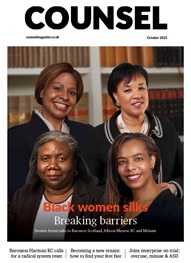*/
Lord Steyn, a former Lord of Appeal in Ordinary, has called for the identity card scheme to be abandoned.
Speaking at the Farrer’s Building second biennial lecture in memory of Lord Williams of Mostyn, Lord Steyn highlighted the lack of evidence that a National Identity Register – which will store geographical information, biometric data and administrative data linked to the use of ID cards – will serve to combat serious crime, and expressed concerns about the privacy implications for members of the public given the series of security leaks which have occurred.
“In my view a national identity card system is not necessary in our country. No further money should be spent on it. The idea should be abandoned,” he said.
Lord Steyn questioned whether the government’s competence in running an identity card system had been demonstrated, citing numerous data losses since May 2007 – including the well-publicised loss of two discs of child benefit data lost by HM Revenue & Customs which affected 25 million individuals; the loss of details of 3 million driving test candidates, including names, addresses and telephone numbers; and the theft of a laptop which contained the names, addresses and bank details of 10,000 National Health Service employees. Such instances, he said, “legitimately prompt the question whether the British public should have confidence in the scheme the government proposes to introduce”. He also queried whether “as we head into what may be a prolonged economic downturn, this is an opportune time for the introduction of an ID card scheme.”
Lord Steyn went on to say that successive UK governments had constructed one of the most comprehensive and technologically advanced systems in the world. “The Home Office proudly asserts that comprehensive surveillance has become routine,” he said. “If that is true, the resemblance to the world of Kafka is no longer so very distant.” He referred to the estimated 4.2 million CCTV cameras in operation in the UK. “It is said that a person living and working in London is likely to be filmed about 300 times on an average day,” he said.
Lord Steyn also said that there was “little hope of the Executive taking action to counter the excesses of the surveillance society. On the contrary, the state relentlessly acts to extend surveillance practices and to diminish correspondingly our civil liberties.”
Speaking at the Farrer’s Building second biennial lecture in memory of Lord Williams of Mostyn, Lord Steyn highlighted the lack of evidence that a National Identity Register – which will store geographical information, biometric data and administrative data linked to the use of ID cards – will serve to combat serious crime, and expressed concerns about the privacy implications for members of the public given the series of security leaks which have occurred.
“In my view a national identity card system is not necessary in our country. No further money should be spent on it. The idea should be abandoned,” he said.
Lord Steyn questioned whether the government’s competence in running an identity card system had been demonstrated, citing numerous data losses since May 2007 – including the well-publicised loss of two discs of child benefit data lost by HM Revenue & Customs which affected 25 million individuals; the loss of details of 3 million driving test candidates, including names, addresses and telephone numbers; and the theft of a laptop which contained the names, addresses and bank details of 10,000 National Health Service employees. Such instances, he said, “legitimately prompt the question whether the British public should have confidence in the scheme the government proposes to introduce”. He also queried whether “as we head into what may be a prolonged economic downturn, this is an opportune time for the introduction of an ID card scheme.”
Lord Steyn went on to say that successive UK governments had constructed one of the most comprehensive and technologically advanced systems in the world. “The Home Office proudly asserts that comprehensive surveillance has become routine,” he said. “If that is true, the resemblance to the world of Kafka is no longer so very distant.” He referred to the estimated 4.2 million CCTV cameras in operation in the UK. “It is said that a person living and working in London is likely to be filmed about 300 times on an average day,” he said.
Lord Steyn also said that there was “little hope of the Executive taking action to counter the excesses of the surveillance society. On the contrary, the state relentlessly acts to extend surveillance practices and to diminish correspondingly our civil liberties.”
Lord Steyn, a former Lord of Appeal in Ordinary, has called for the identity card scheme to be abandoned.


Justice system requires urgent attention and next steps on the Harman Review
Q&A with Tim Lynch of Jordan Lynch Private Finance
By Marie Law, Director of Toxicology at AlphaBiolabs
By Louise Crush of Westgate Wealth Management
Why Virtual Assistants Can Meet the Legal Profession’s Exacting Standards
Six months of court observation at the Old Bailey: APPEAL’s Dr Nisha Waller and Tehreem Sultan report their findings on prosecution practices under joint enterprise
The Amazonian artist’s first international solo exhibition is wholly relevant to current issues in social and environmental justice, says Stephen Cragg KC
Despite its prevalence, autism spectrum disorder remains poorly understood in the criminal justice system. Does Alex Henry’s joint enterprise conviction expose the need to audit prisons? asks Dr Felicity Gerry KC
Until reforms are instituted and a programme of training is introduced, expert opinion on intimate partner abuse remains vital to realigning the tilted scales of law and justice, writes Professor Susan Edwards
It’s been five years since the groundbreaking QC competition in which six Black women barristers, including the 2025 Chair of the Bar, took silk. Yet today, the number of Black KCs remains ‘critically low’. Desirée Artesi talks to Baroness Scotland KC, Allison Munroe KC and Melanie Simpson KC about the critical success factors, barriers and ideas for embedding change